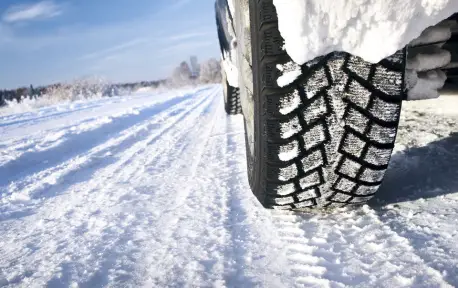
Whether or not you need winter tires depends on a number of things - some of which you cannot control. Take your place of residence, for example: In which country and in which region are you driving your car? Some regions require winter tires, while in others they are only recommended. In other locations, such as the Southern states, most drivers use summer or all-season tires all year round.
Winter and snow tires may be safer
Compared to all-season tires, winter and snow-specialized tires are often a safer choice. There are many differences between tires for summer and winter. Both the rubber compound and the profile structure differ significantly.
For winter and snow tires to perform well in colder temperatures, their lamellar structure is adapted to the cold, and they are made with a softer material mixture than the comparatively hard summer tires. The result is inevitably longer braking distances on dry surfaces. However, hard rubber compounds also lead to less abrasion and wear on quality summer tires.
In principle, despite the existence of all-weather tires, it can still be said that winter tires are the best choice for winter and are generally superior to all-season tires in winter weather.
Do I need winter and snow tires?
Advantages of winter & snow tires include:
- Winter tires ensure optimal driving behavior at low temperatures.
- They offer the best possible grip in snow and mud.
- They brake much better on cold roads than summer or all-season tires.
- Thanks to their higher proportion of natural rubber, winter tires remain flexible even in extreme cold, when summer tires can already become brittle.
- If you live in a remote area with snow and ice in winter, winter tires ensure your mobility.
- On routes with uphill or downhill slopes, you benefit from the greater grip of winter tires on snow and ice.
Disadvantages of winter & snow tires:
- Winter tires should not be used all year round - their performance decreases in warm weather and their wear increases.
- If you decide to equip your car with both summer and winter tires, there are expenses associated with it.
- Not only does the price of the two sets of tires including spare tires play a role, but also the cost of the second set of rims, which makes it easier for you to change tires.
- If you do not store the tires yourself, you may also have to pay storage costs and of course the workshop costs for changing them every six months.
Do you mainly drive where winter and snow tires are not compulsory but are you thinking about purchasing them? Then we would like to take this opportunity to provide you with more information about the advantages and disadvantages of winter tires.
If you are driving in areas where winter tires are compulsory, you have little choice. If winter tires are only recommended for you, you should weigh the costs against the benefits. Depending on the type of weather you have to expect on your roads, the better grip and higher safety of winter tires can quickly pay off for you.
Same articles

Understanding Vehicle Inspection and Verification Services: Why They Matter for Every Driver
GuidesVehicle inspection and verification services are an essential but often overlooked part of keeping roads safe and cars legally compliant. Most people only think about inspections when it’s...
KLIFEX Brand Overview: High-Quality Automotive Repair Kits for Affordable Repairs
GuidesThe automotive aftermarket has long needed solutions that combine reliability, durability, and affordability. Many car enthusiasts and services are looking for a way...
Fast, Reliable Vehicle Emissions & Inspection Services Made Simple
GuidesFast, reliable emissions and inspection services are essential for keeping vehicles road-ready, compliant with environmental regulations, and safe for daily driving. If you’re looking for quick...

